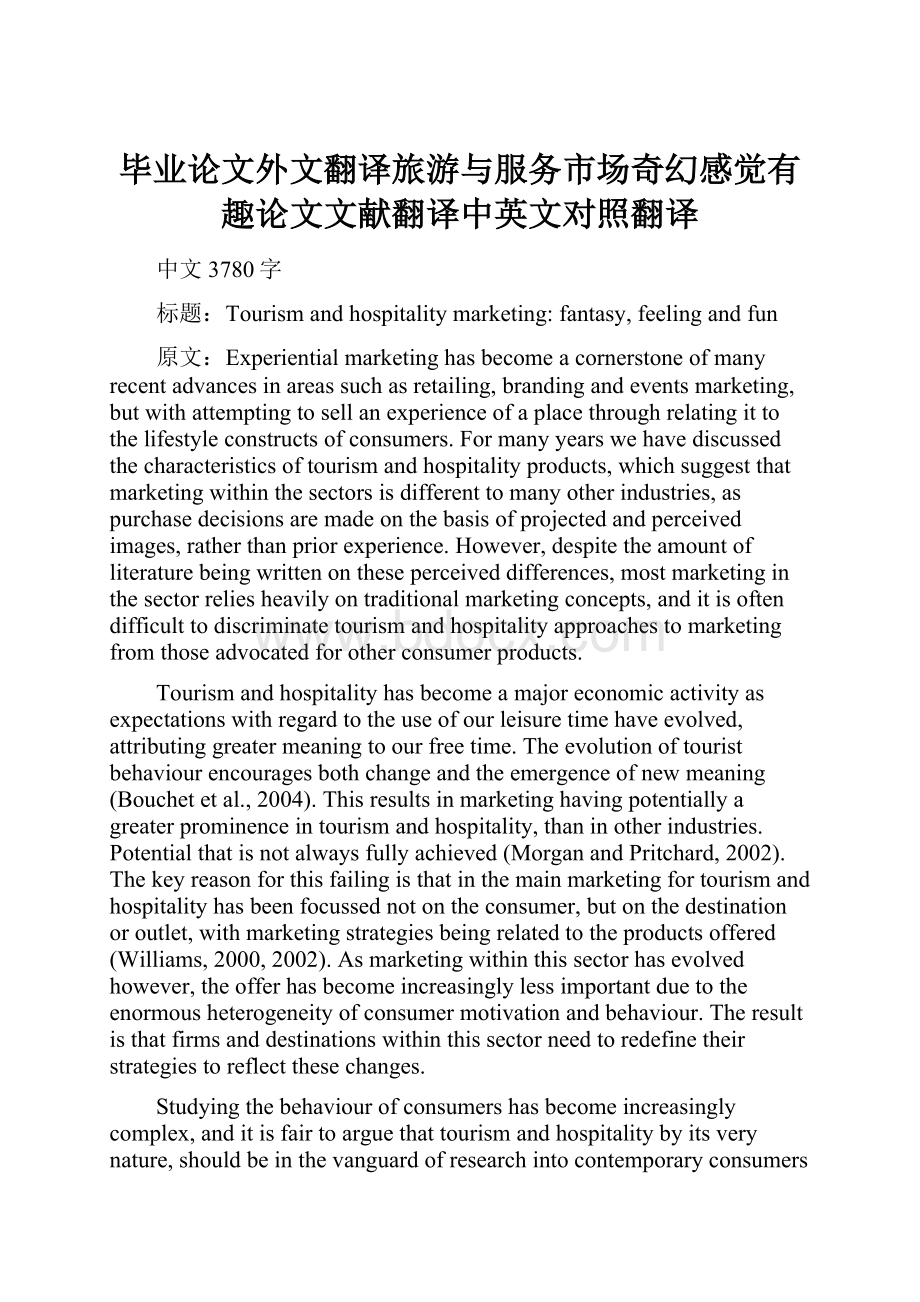毕业论文外文翻译旅游与服务市场奇幻感觉有趣论文文献翻译中英文对照翻译.docx
《毕业论文外文翻译旅游与服务市场奇幻感觉有趣论文文献翻译中英文对照翻译.docx》由会员分享,可在线阅读,更多相关《毕业论文外文翻译旅游与服务市场奇幻感觉有趣论文文献翻译中英文对照翻译.docx(10页珍藏版)》请在冰豆网上搜索。

毕业论文外文翻译旅游与服务市场奇幻感觉有趣论文文献翻译中英文对照翻译
中文3780字
标题:
Tourismandhospitalitymarketing:
fantasy,feelingandfun
原文:
Experientialmarketinghasbecomeacornerstoneofmanyrecentadvancesinareassuchasretailing,brandingandeventsmarketing,butwithattemptingtosellanexperienceofaplacethroughrelatingittothelifestyleconstructsofconsumers.Formanyyearswehavediscussedthecharacteristicsoftourismandhospitalityproducts,whichsuggestthatmarketingwithinthesectorsisdifferenttomanyotherindustries,aspurchasedecisionsaremadeonthebasisofprojectedandperceivedimages,ratherthanpriorexperience.However,despitetheamountofliteraturebeingwrittenontheseperceiveddifferences,mostmarketinginthesectorreliesheavilyontraditionalmarketingconcepts,anditisoftendifficulttodiscriminatetourismandhospitalityapproachestomarketingfromthoseadvocatedforotherconsumerproducts.
Tourismandhospitalityhasbecomeamajoreconomicactivityasexpectationswithregardtotheuseofourleisuretimehaveevolved,attributinggreatermeaningtoourfreetime.Theevolutionoftouristbehaviourencouragesbothchangeandtheemergenceofnewmeaning(Bouchetetal.,2004).Thisresultsinmarketinghavingpotentiallyagreaterprominenceintourismandhospitality,thaninotherindustries.Potentialthatisnotalwaysfullyachieved(MorganandPritchard,2002).Thekeyreasonforthisfailingisthatinthemainmarketingfortourismandhospitalityhasbeenfocussednotontheconsumer,butonthedestinationoroutlet,withmarketingstrategiesbeingrelatedtotheproductsoffered(Williams,2000,2002).Asmarketingwithinthissectorhasevolvedhowever,theofferhasbecomeincreasinglylessimportantduetotheenormousheterogeneityofconsumermotivationandbehaviour.Theresultisthatfirmsanddestinationswithinthissectorneedtoredefinetheirstrategiestoreflectthesechanges.
Studyingthebehaviourofconsumershasbecomeincreasinglycomplex,anditisfairtoarguethattourismandhospitalitybyitsverynature,shouldbeinthevanguardofresearchintocontemporaryconsumers(Williams,2002).Tourismandhospitalityoffersamultitudeofvenuesinwhichpeoplecanconsume.Bars,restaurants,hotels,themeparks,casinosandcruiseshipsalloperateas“Cathedralsofconsumption”(Ritzer,1999)offeringincreasinglycomplexconsumptionopportunitiestoincreasingly
complexconsumers.Tourismandhospitalityhasdevelopedintooneofthemostimportantglobaleconomicactivities,dueinparttoacombinationofatransformationofoffersandincreasinglypostmoderndemand.Thesechangesmeanthattourismandhospitalityconsumptionhasevolvedtobecomemorequalitative,moredemanding,andmorevaried(Bouchetetal.,2004).
Anecdotalevidencedeliveredthroughmediacoverage,wouldsuggestthatcontemporaryconsumersareself-indulgent,pleasureseekingindividuals,easilydominatedbymarketersandadvertisers,whoactlikesheepinthewaystheymimicreferentothers.However,therealityisobviouslymuchmorecomplexthansuchascenariosuggests.Contemporaryconsumersareaslikelytobedrivenbythriftastotheyaretobehedonistic,theyuseconsumptiontomakestatementsaboutthemselves,theyuseconsumptiontocreatetheiridentitiesandtheydevelopasenseofbelongingthroughconsumption.Formanypeopleitisthroughconsumptionthatrelationshipsareformed,forexample,colleaguesenjoyingadrinkafterworkorchildrenhostingtheirbirthdaypartiesatMcDonalds,enablingthemtodefinetheircircleoffriends.Consumptionalsoplaysapartinfindingfulfilment,developingcreativityandexpressingtheirindividualabilities.Clearlysuchacomplexphenomenacannotbeeasilyunderstood.
Recentargumentshavebeensoundedthataspectsofcontemporarytourismandhospitalityconsumptionhavereflectedthephenomenaofpostmodernism.Whilstmanybelievepostmodernismtobeameaninglessintellectualfad,inaccessibletomanyinvolvedinmarketingwithinoursector,othersagreethatthereareworthwhileinsightstobegainedfromthedebateonthepost-modernconditionanditsconsequencesfortourismandhospitalityconsumptionandmarketing.Idonotintendtodiscussatlengththeuseofpost-moderndiscourseintourismandhospitalitymarketingasIhaveexerciseditinpreviouswork(Williams,2000,2002).Thetermpostmodernismreferstoabreakinthinkingawayfromthemodern,functionalandrational,andduringthelastcoupleofdecadesithasspreadacrossalldomainsofknowledge,includingmarketing.Thekeyconceptsofpost-modernmarketingarefragmentation,indeterminacyanddistrustofuniversaldiscourse,butbyeschewingmodernismitintroducesaradicallynewanddifferentculturalmovementwhichcoalescesinareconceptualisationofhowweexperienceandexplainourworld.Intermsofexperientialmarketingtwoaspectsofthepost-moderndiscoursearemostrelevant,hyperealityandimage.
Hyperealityisoneofthemostdiscussedconditionsofpostmodernism,andreferstotheargumentthatrealityhascollapsedandhasbecomeimage,illusion,simulationandsimulacra(copiesforwhichnooriginalexists).Hyperrealityreferstoablurringofdistinctionbetweentherealandtheunrealinwhichtheprefix“hyper”signifiesmorerealthanreal.Whentherealisnolongeragivenbutisreproducedbyasimulatedenvironment,itdoesnotbecomeunreal,butrealerthanreal,totheextentitbecomeswhatBaudrillard(1993,p.23)referstoas“ahallucinatoryresemblanceofitself”.Inpostmodernism,withtheadventofhyperreality,simulationscometoconstituterealityitself.Thisscenarioisexemplifiedthroughoutthetourismandhospitalityindustry.BaudrillardhimselfusedtheexampleofDisneyland,arguingitismorerealthantheUSAitself.ApointreinforcedbyVenturi(1995,p.67)whosuggested“Disneylandisnearertowhatpeoplewantthanwhatarchitectshaveevergiventhem.DisneylandisthesymbolicAmericanutopia”.Inpostmodernsocietypeoplehavebecomefascinatedbysignsandasaresult,theyexistinastatewheresignsandimageshavebecomemoreimportantthanwhattheystandfor.Theresultisthattoday’sconsumersconsumeimageryanddonotfocusonwhattheimagesrepresentormean.AsMillerandReal(1998,p.30)argue“weliveinaworldwheretheimageorsignifierofaneventhasreplaceddirectexperienceandknowledgeofitsreferentorsignified”.
Whileitisacceptedthatthereareproblemswithinvestigatingtourismandhospitalitymarketingthroughapostmodernorientation,itclearlyencompassesabroadrangeofconsumerexperiences.Inadditionithasthepotentialtoreframeourthinkingaboutmarketingpracticeinanincreasinglyfragmentedglobalmarketplace.
Abetterunderstandingoftheunderlyingmacroforcesandmicrobehaviour,associatedwithpostmodernism,canbeleveragedbymarketerstoobtaincompetitiveadvantagesintheincreasinglydynamic,unpredictable,unstableandcompetitivetourismandhospitalityenvironment.
Traditionalmarketingprovidedavaluablesetofstrategies,implementationtoolsandmethodologiesthattourismandhospitalityfirmscoulduseinanearlierage.AsSchmitt(1999,p.55)argued“traditionalmarketingwasdevelopedinresponsetotheindustrialage,nottheinformation,brandingandcommunicationsrevolutionwearefacingtoday”.Inanewage,withnewconsumersweneedtoshiftawayfromafeatures-and-benefitsapproach,asadvocatedbytraditionalapproachestoconsumerexperiences.Weneedtoconsidernewconceptsandapproacheswhichcapitalizeontheopportunitiesofferedbythesenewconsumers.Onesuchapproachisexperientialmarketing;anapproachwhichincontrasttotherationalfeatures-and-benefitsviewofconsumers,takesamorepostmodernorientationandviewsthemasemotionalbeings,concernedwithachievingpleasurableexperiences.
Experientialmarketingisagrowingtrendworldwide,withenthusiastsreportedinallsectorsoftheglobaleconomy,fromconsumerproductssuchasFordMotorCompany(Kerwin,2004)tohealthcareproviderssuchastheNorthHawaiiCommunityHospital(Hill,2003).AsSchmitt(1999,p.53)states“experientialmarketingiseverywhere”.Thequestioniswhathascausedthisevolutionintheworldofmarketing,andwhataretheimplicationsforconsumersoftourismandhospitality?
ExperientialmarketingwasfirstintroducedbyPineandGilmore(1998)aspartoftheirworkontheexperienceeconomy,andfurtherrefinedinmanysubsequentarticlesandbooksbythesameauthors.PineandGilmore(1999,p.2)explainedtheirviewofexperientialmarketinginthefollowingmanner“whenapersonbuysaservice,hepurchasesasetofintangibleactivitiescarriedoutonhisbehalf.Butwhenhebuysanexperience,hepaystospendtimeenjoyingaseriesofmemorableeventsthatacompanystagestoengagehiminapersonalway”.Experientialmarketingisabouttakingtheessenceofaproductandamplifyingitintoasetoftangible,physical,interactiveexperienceswhichreinforcetheoffer.Ratherthanseeingtheofferinatraditionalmanner,throughadvertisingmediasuchascommercials,printorelectronicmessaging,consumers“feel”itbybeingpartofit.AsGautier(2004,p.8)argues“experientialmarketingisatotallynewwayofthinkingaboutmarketing,ifyouthinkit’saboutsimplytweakingaroundtheedges,thinkagain”.Experientialmarketingisnotaboutone-offevents,sponsorship,samplingorgeneralfieldmarketing.Experientialmarketingdescribesmarketinginitiativesthatgiveconsumersin-depth,tangibleexperiencesinordertoprovidethemwithsufficientinformationtomakeapurchasedecision.Itiswidelyarguedthatasthescienceofmark